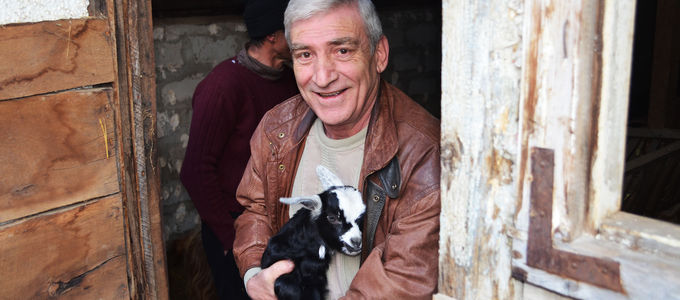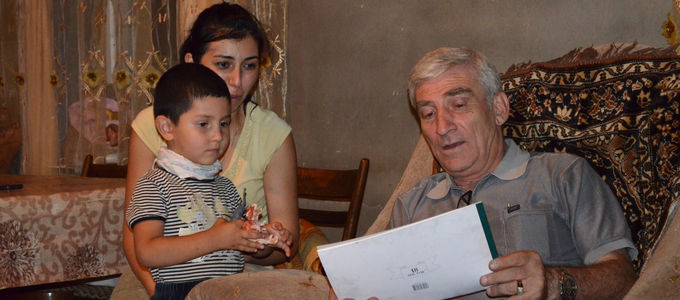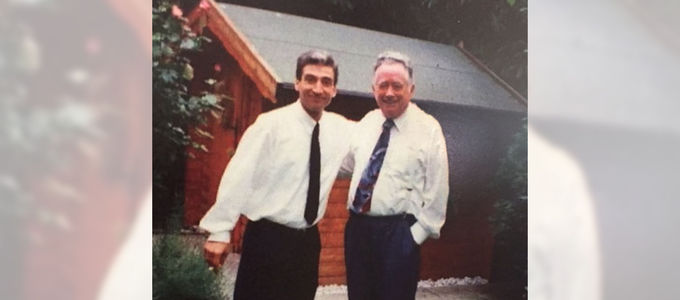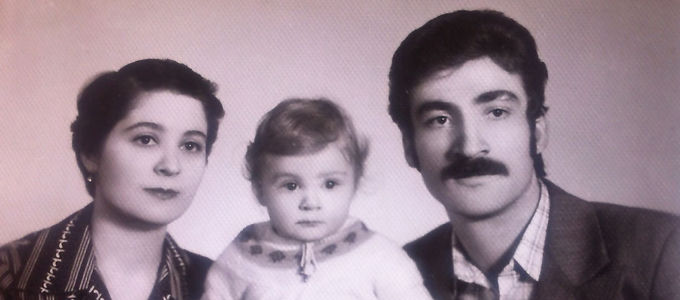
This is the experience of Bishop Rafael Movsesyan. He has been overseeing ongoing aid projects in Armenia since the founding of NAK-karitativ.
How did the intensive co-operation with NAK-karitativ start?
In the aftermath of the 1988 earthquake and the conflicts in Nagorno-Karabakh the Armenian people urgently needed help. Food could only be acquired with food vouchers. Food rations included only 150 grams of bread per day per person. I was working closely with Apostle Kusserow at the time. A little later, in the 1990s, Apostle Bernd Klippert took over from him. He later became the managing director of NAK-karitativ.
To facilitate our social commitment we founded the Gesellschaft für deutsch-armenische Freundschaft (Association for German-Armenian Friendship). The charity work took on special meaning for me personally when my daughter, Liana, died after a car accident. At the time—it was in 2004—we began to set up kindergartens together with Semper pro humanitate. Later NAK-karitativ helped to establish additional kindergartens. To date we have eight kindergartens, six in Armenia and two in Georgia. One of them is run by my wife. For her this is the best thing that could have happened to her after our daughter died. Most of the children come from families who live in impoverished conditions.
Over the years, emergency medical care began to be provided through NAK-karitativ as well. That was a big help. A lot of people owe their lives or rather their health to this programme.
How is the situation in Armenia today?
Poverty is a hard fact in our country. During the war many people left and found work in Russia. Armenia seemed like a God-forsaken country. Corruption and gang violence came to be widespread. There is no middle class. Five to eight per cent of the population is wealthy. The rest are poor. All you have to do is look out the window: on one side of the road you will see a Bentley and on the other side abject poverty. Almost every house is connected to the gas supply, but hardly anyone uses it because it is too expensive. People cook with wood, and in winter they also heat their homes with wood.
How can the people be helped in this dilemma?
The income-generating projects currently being carried out are a very good approach. They are not major projects. We do not establish factories or anything even close to that. We help families to breed animals on a small scale, for example, or establish another small business. This puts them in a position to fend for themselves. They no longer have to go hungry. The pressure to go to Russia to find work is finally letting up, and the families can stay together. As their self-reliance increases and they begin to see the first modest successes and earn their own livelihood they also regain some of their self-confidence and hope for a brighter future.
A family from the region of Tavush is a wonderful example. The parents—both have a slight mental disability—and their daughter live in extreme poverty. They heard about our programme and really wanted to benefit. By breeding chickens and selling eggs the family is generating some income and their situation has improved markedly. It is touching to see how committed they are and how well the father looks after the chickens. He is so proud to be able to do something for his family. .
There is another example, the so-called cake project. I really had not expected this project to take off at all. The woman kept calling and had so many questions. And then without any assistance she made a contract with two businesses. Now she has steady customers and a small income.
What are your hopes for Armenia?
I wish my people lasting peace and an upswing of the economy. It would be a major achievement if the food supply could be secured and everyone had enough to eat. This is particularly important for the children. We cannot count on state subsidies. If children have been able to eat their fill and you ask them how they are, they will answer: “Good.” It does not take much: regular meals, at least one warm meal a day, loving and caring parents, and some toys …
How do you see the future?
The Armenians are a proud people, and they are also a religious people. I am confident that with their trust in God and their hope and a little support their lives will improve. There is a lot of potential in the young generation. In addition to this we have well-functioning families. Through these family ties they are very close and help one another.












